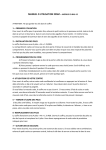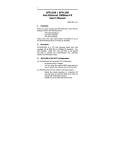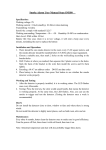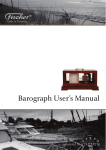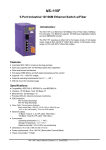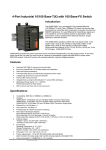Transcript
RP-1450FC/FT 3. RP-1450FC/FT PCI Configuration 6. Network Connection Fast Ethernet 100Base-FX For motherboards with automatic PCI configuration: ⎯ No specific setup is needed ⎯ You can enter the system BIOS setup menu to view or specify the interrupt line of the PCI slots For motherboards with bus master & interrupt jumpers: ⎯ Enable bus master operation in a selected PCI slot and select an interrupt (IRQ) level using the appropriate motherboard jumper ⎯ Enable I/O on the RP-1450FC/FT PCI slot 100Base-FX network allows 512-bit time delay between any two node stations in a collision domain. The Fiber cable with devices’ bit-time delay (round trip) is as below: User's Manual (623-0131-000) 1. Overview RP-1450FC/FT is a PCI Fast Ethernet Board that fully complies with all IEEE 802.3u and 100Base-FX standards. Two LED indicators (LINK/ACT, FDX) on the bracket will help oversee the network/board link, activities, collision and full-duplex status. 2. Checklist Before you start installing the RP-1450FC/FT, verify that the package contains the following items: ⎯ RP-1450FC/FT Board ⎯ LAN Driver Diskette ⎯ This User's Manual Please notify your sales representative immediately if any of the aforementioned items is missing or damaged. Boot Rom Socket Notch 4. PCI Bus System & Configuration • Ensure that the PCI machine does support master slots, INT multiple sharing and timing compatibility. Do not install FE-1450 FX in PCI slave slots. Please refer to your PCI system manual and select the appropriate configuration settings. • When installing multiple RP-1450FC/FT boards at the server station, you should correctly configure the IRQ settings of the PCI slot. Up to four RP-1450FC/FT boards can be installed in a PCI file server running NetWare system. The RP-1450FC/FT server boards share the same interrupt line with the driver supporting multiple INT services at a time. Each RP-1450FC/FT's IRQ should not conflict with other boards. • Operation in full or half-duplex (Default) mode is configured by LAN driver options. The operating mode should match the remote link device’s working status. • You must use EMM386 version 4.49 or higher, and install both DOS & EMM386 that came from the same DOS package to avoid software problems. 5. Diagnostic LEDs & Boot ROM Fig. 1 Diagnostic LEDs and Boot ROM Socket 1 The LINK/ACT LED lights when fiber cable connection is good and blinks to indicate the activity. Collision and fullduplex LED report the board’s operating status. To add the Remote Boot feature to a workstation, you can insert the Boot ROM into the socket (See Fig.1). 2 Class II Hub 92 DTE↔DTE 100Base-FX 100 Fiber Cable 1.0/m The overall bit-time of Fiber wires and devices must be within 512 bit in a segment. You may use Switching Hub to break up collision domain and extend the cabling distance. • Fiber Cable(multi-mode) Limitations: Node to Node Node to Hub Hub to Hub Node to Node Node to Hub Hub to Hub Node to Node Node to Hub Hub to Hub Half-duplex Class II Hub Half-duplex Switching Hub Full-duplex Switching Hub 205m 100m 5m 412m 412m 412m 2Km 2Km 2Km 7. Technical Specifications • • • • • • • • Standard : IEEE 802.3u Fast Ethernet 100Base-FX Data Transfer Mode / Speed: ⎯ PCI bus master ⎯ Full or half-duplex(Default) mode ⎯ 100Mbps speed LED Indicators: LINK/ACT, FDX on the bracket Power Requirement : 1.0A @+5V Ambient Temperature : 0 to 50°C Humidity : 5% to 90% PCB Dimensions: 22.5(H) × 80(W) ×138(D) mm Complies with FCC Part 15 Class A and CE Mark Note: For connecting this device to Router, Bridge or Switch, please refer to the corresponding device's Technical Manual. 3
